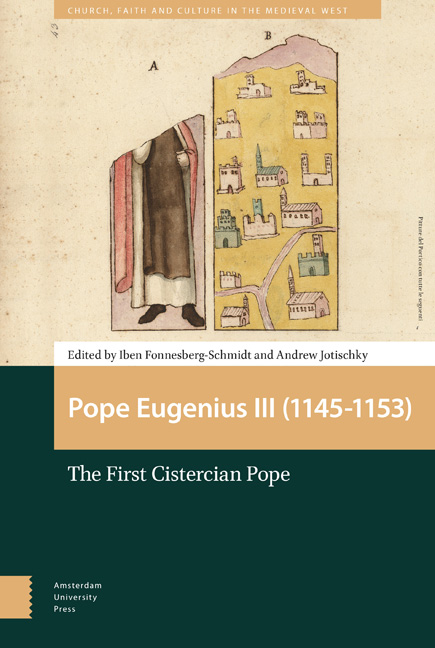Book contents
- Frontmatter
- Contents
- Preface
- Abbreviations
- Maps and Figures
- Introduction
- 1 ‘Justinian’s Laws, not the Lord’s’: Eugenius III and the Learned laws
- 2 Curial Politics and Papal Power : Eugenius III, the Curia, and Contemporary Theological Controversy
- 3 The Cistercians, Eugenius III, and the Disputed York Election
- 4 Eugenius III and the Crusades to the East
- 5 Eugenius III and the Northern Crusade
- 6 The Benefits of Exile
- 7 Eugenius III and France: the Protected Protector
- 8 A Golden Rose and the Deaf Asp that Stoppeth her Ears: Eugenius III and Spain
- 9 Eugenius III and the Roman Commune
- 10 Eugenius III Reclaims the Patrimony of St Peter
- 11 Eugenius III’s Privileges to Cistercian Houses
- 12 Eugenius III at Cîteaux, 1147
- 13 Eugenius III and the Church in the Crusader States
- Index
3 - The Cistercians, Eugenius III, and the Disputed York Election
Published online by Cambridge University Press: 22 December 2020
- Frontmatter
- Contents
- Preface
- Abbreviations
- Maps and Figures
- Introduction
- 1 ‘Justinian’s Laws, not the Lord’s’: Eugenius III and the Learned laws
- 2 Curial Politics and Papal Power : Eugenius III, the Curia, and Contemporary Theological Controversy
- 3 The Cistercians, Eugenius III, and the Disputed York Election
- 4 Eugenius III and the Crusades to the East
- 5 Eugenius III and the Northern Crusade
- 6 The Benefits of Exile
- 7 Eugenius III and France: the Protected Protector
- 8 A Golden Rose and the Deaf Asp that Stoppeth her Ears: Eugenius III and Spain
- 9 Eugenius III and the Roman Commune
- 10 Eugenius III Reclaims the Patrimony of St Peter
- 11 Eugenius III’s Privileges to Cistercian Houses
- 12 Eugenius III at Cîteaux, 1147
- 13 Eugenius III and the Church in the Crusader States
- Index
Summary
Abstract
The chapter deconstructs the existing narrative of the disputed election to the archbishopric of York in 1140. William Fitzherbert was so vehemently opposed by the abbots of Fountains and Rievaulx that they campaigned to cancel the election in favour of a reforming candidate. In Rome, they gained the support of Bernard of Clairvaux while Eugenius III's election also favoured the white monks. William Fitzherbert was deposed and Abbot Henry Murdac of Fountains was elected in his place. While the extensive historiography of this conflict focuses on the political context as well as on the specific regional Yorkshire setting, this contribution addresses Cistercian strategy and the connection of their agenda in York with the wider ideas of reform of Cistercian leaders.
Keywords: Cistercians; disputed episcopal elections; Fountains Abbey; historiography; papacy; Bernard of Clairvaux
The dispute over the election of the new archbishop of York after the resignation and death of Archbishop Thurstan in 1140 has come to be seen as one of the episodes exemplifying the power of the twelfth-century monastic reform movement and its influence on the far-flung corners of Latin Europe. The case was first analysed by David Knowles in the 1950s and 60s and then further by Derek Baker in the 1970s. More recently Christopher Norton's study of William Fitzherbert has reopened and extended the issues under debate. These studies not only established the complex details of various stages of the conflicts, but also explained the reasons behind the different stands taken by those supporting and opposing William's election in 1141. While Knowles's conclusions rested largely on his assessment of the personal characters of the key players, Baker took issue with the idea that the dispute can be seen as ‘part of a European struggle for freedom of election and for reform’. His study concentrated, however, on a re-examination of the details of the dispute within the immediate context of Yorkshire and English politics of King Stephen's reign. In his recent study of William of York, Norton once again posed the question of the reasons for the involvement of Cistercians in the conflict. He concentrated on the complex Yorkshire context of the affairs in far greater detail and in a more nuanced fashion than previous scholars. Yet, although the specific English background was undoubtedly a very important factor in the Cistercian involvement, the personal and local political background does not give a full answer, especially to the question of Eugenius's own involvement.
- Type
- Chapter
- Information
- Pope Eugenius III (1145–1153)The First Cistercian Pope, pp. 101 - 124Publisher: Amsterdam University PressPrint publication year: 2018

